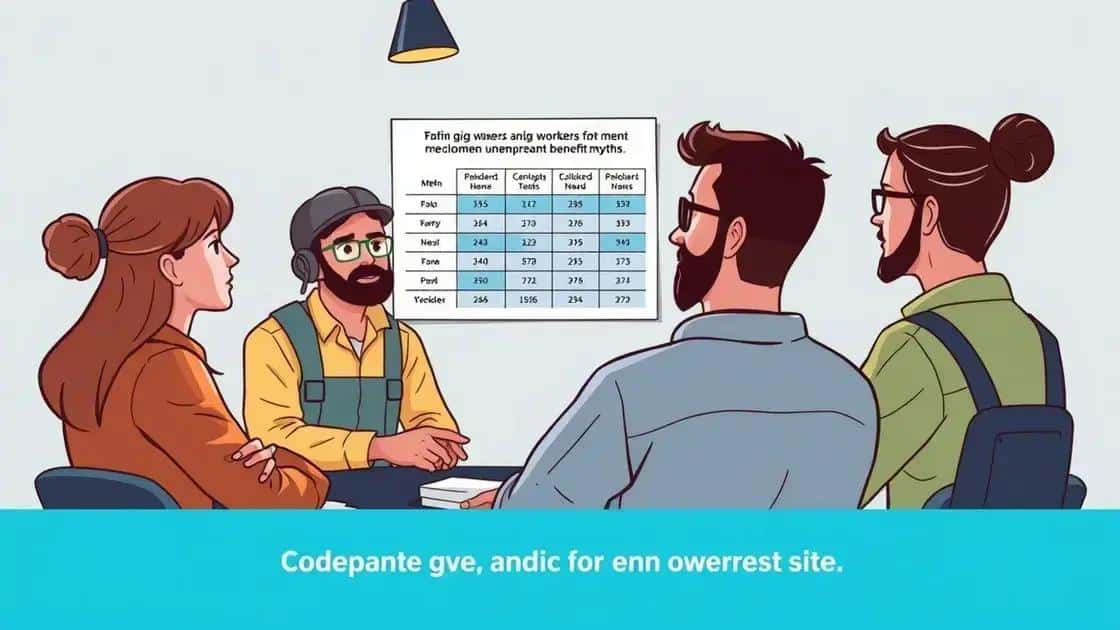Expanded unemployment benefits for gig workers: what you need to know

Expanded unemployment benefits for gig workers provide crucial financial support during income loss, allowing them to qualify based on specific criteria like work history and reasons for job loss, regardless of their employment status.
Expanded unemployment benefits for gig workers have become a hot topic, especially during economic downturns. Have you ever wondered how these benefits could support your financial stability? Let’s dive into the details.
Understanding expanded unemployment benefits
Understanding expanded unemployment benefits is essential for gig workers navigating uncertain economic times. These benefits are designed to provide financial relief to those who may not qualify for traditional unemployment insurance.
What Are Expanded Unemployment Benefits?
Expanded unemployment benefits offer additional support beyond standard unemployment payments. This includes longer coverage periods and increased weekly amounts. These benefits help gig workers maintain their income during tough times.
Who Qualifies for Expanded Benefits?
Many gig workers are eligible for these expanded unemployment benefits. To qualify, you typically need to show a loss of income due to reasons related to COVID-19 or other specific circumstances.
- Self-employed individuals
- Freelancers
- Contract workers
- Individuals with limited work history
It’s vital for workers to be aware of their eligibility, as some may not realize they can apply. Therefore, researching local regulations and benefit availability is crucial for anyone in the gig economy.
In addition to understanding the types of benefits available, maximizing these benefits involves careful documentation of income loss and other relevant factors. This includes keeping track of your work history and any gig commitments you had before the downturn.
Moreover, being proactive in your applications can make a significant difference. While the process may seem complicated, there are resources and guidelines available to help streamline applications for expanded unemployment benefits. Seeking assistance from local workforce development offices or online platforms can be a great way to find help navigating the system.
Eligibility criteria for gig workers

Eligibility criteria for gig workers applying for expanded unemployment benefits can vary by location and specific circumstances. Understanding these criteria is key to ensuring you receive the support you need.
Basic Eligibility Factors
To qualify, gig workers must meet certain basic criteria. These factors help determine your eligibility for benefits:
- You must have lost income due to COVID-19 or other acceptable reasons.
- You should be able to show documentation of your prior income.
- You must be actively looking for work or able to start work if offered.
- You need to be registered with your local unemployment office.
Having the correct documentation is crucial. Many gig workers underestimate the importance of this step. Gathering tax returns, payment statements, and records of previous gigs can support your application significantly.
Additionally, the criteria might change if local laws update or if specific federal guidelines are enacted. It’s essential to stay informed about any changes that could affect your eligibility.
Work History Considerations
Your work history also plays a major role in your eligibility. If you’ve worked in multiple gigs or freelance jobs, make sure to list all your experience. Some programs will consider your total earnings over the past year.
Applying promptly after losing work can make a positive difference, as benefits may not cover the entire gap if you wait too long. Remember, navigating the application process can be tricky, so don’t hesitate to seek help from available resources.
How to apply for unemployment benefits
Applying for unemployment benefits can seem daunting, especially for gig workers. However, understanding the steps involved can make the process smoother and more efficient.
Step-by-Step Application Process
The first step is gathering necessary documents. You will typically need:
- Your Social Security number.
- Proof of income, such as tax returns or pay stubs.
- A description of your job and how you lost income.
- Your contact information.
Once you have your documents ready, you can begin the application process. Most states allow you to apply online, which is the fastest method. The online application typically includes questions about your employment history and reasons for unemployment.
Be Prepared for Verification
After submitting your application, you may need to provide additional information. Sometimes state unemployment agencies will contact you to verify your answers. It’s important to respond promptly to any requests. This can help avoid delays in receiving benefits.
Additionally, keep an eye on important deadlines. Many states have time frames for submitting claims and responding to inquiries, so staying organized is crucial. Missing a deadline can affect your eligibility for unemployment benefits.
If you face difficulties during the application process, support is available. Check for local workforce development offices or online help centers that offer assistance tailored specifically for gig workers.
Common misconceptions about unemployment benefits

Many gig workers have misconceptions about unemployment benefits. These misunderstandings can prevent them from accessing vital support. It’s essential to clear up these common myths to help workers make informed decisions.
Myth 1: Only Full-Time Employees Can Apply
One major misconception is that only full-time employees qualify for unemployment benefits. In reality, many gig workers, freelancers, and part-time workers are eligible if they meet certain criteria. If you’ve lost income due to an eligible reason, you can apply!
Myth 2: You Can’t Get Benefits if You Quit
Another common belief is that quitting your job automatically disqualifies you from receiving benefits. While it’s true that voluntarily leaving a job can impact your eligibility, certain circumstances—like unsafe work conditions—may still allow you to qualify for benefits.
- Health reasons
- Family emergencies
- Unsafe working conditions
If you have faced any of these situations, keep that in mind when applying.
Myth 3: Applying is Complicated
Many think that the application process is complicated and time-consuming. While it can seem overwhelming, the process has become more streamlined in many states. Most applications are now done online, making it easier to gather necessary information and submit your claim.
Furthermore, assistance is often available. Local workforce programs or online resources can help guide you through the application process, making it easier to navigate.
Clearing up these misconceptions can empower gig workers to pursue the benefits they’re entitled to, supporting their financial stability during challenging times.
FAQ – Frequently Asked Questions about Expanded Unemployment Benefits for Gig Workers
What are expanded unemployment benefits?
Expanded unemployment benefits provide additional financial support for gig workers who lose income, offering help beyond standard unemployment insurance.
Who qualifies for these benefits?
Eligibility includes gig workers, freelancers, and part-time workers who have lost income due to specific reasons like COVID-19.
How do I apply for unemployment benefits as a gig worker?
To apply, gather necessary documents such as your Social Security number and proof of income, then submit your application online, which is usually the quickest method.
What are some common misconceptions about unemployment benefits?
Many believe only full-time employees can apply or that quitting a job disqualifies you. However, gig workers can qualify and certain circumstances may not affect eligibility.





